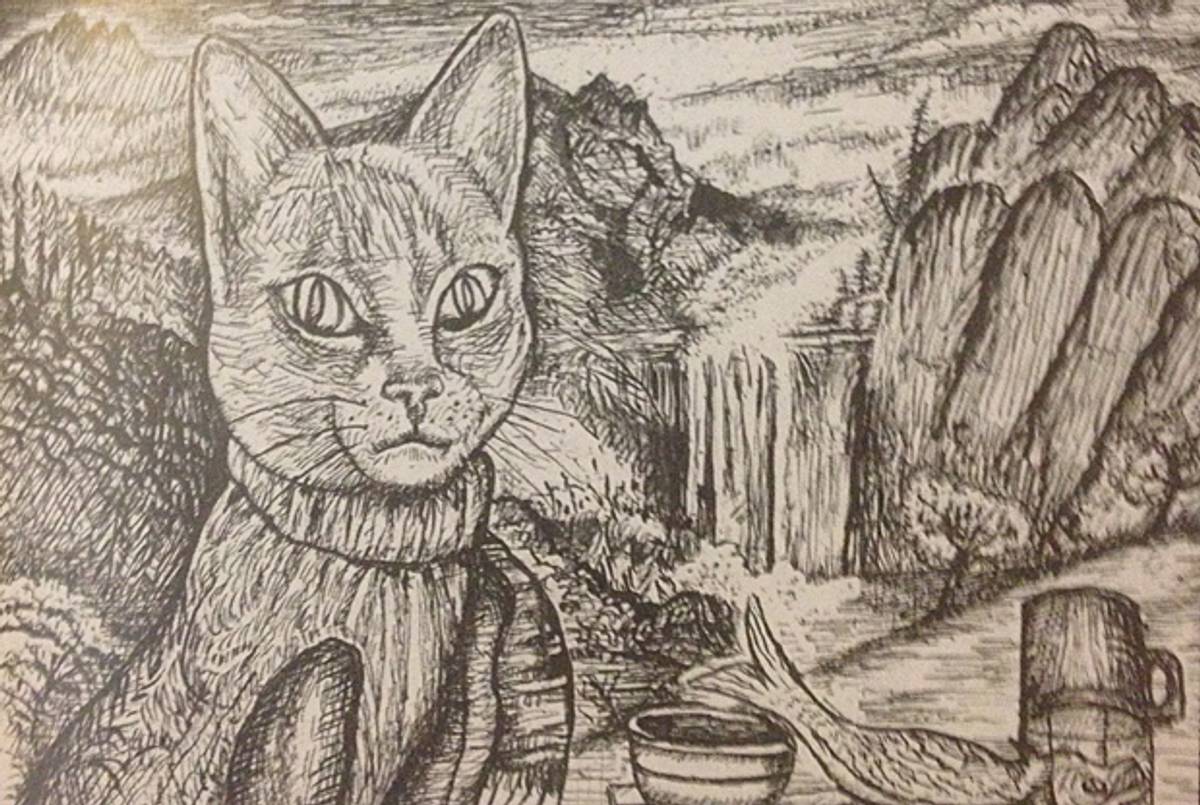
A cat must be loyal to family
And do his best to keep folk free
A cat may kill spiders, mice and rats
But never, ever other cats
A cat shouldn’t steal, curse or lie
Or poke his neighbor in the eye
That’s from the Cat Code of Conduct, a set of laws newly independent cats must follow in order to live peacefully and productively in Lauri Bortz’s new novella, Kung Fu Kitty: Laying Down the Law. It tells the story of what happens after “Let my people go”—though in this case the people are cats, living in China, who have recently been freed from enslavement in Monkey Kingdom. (Their emancipation from Monkey Kingdom was covered in the first book of the series, Kung Fu Kitty.)
It’s a bizarre, complex story, which follows Wu Zhua, the leader of Catland who has just freed his people from bondage, as he navigates the tricky reality of independence. For cats. The story is accompanied by intricate illustrations by Michael Gentile, which depict the feline cast of character in various emotional states (plus their frightening former monkey overlords).
Once you get the hang of who’s who and what’s going on, the story lines up nicely with the second half of Exodus. Here’s Wu Zhua returning to Catland after having received the Cat Code of Conduct, the new laws of Catland, on a magic silk scroll from the Water God, who lives atop Mount Taishi, one of China’s highest mountains. Sound familiar-ish? (There’s also a pivotal visit to the Wuvians, a cat population living in outer space who have perfected the art of living by the ‘CCC,’ but I won’t confuse you too much here.)
Wu Zhua marched into town self-assuredly, CCC firmly clutched in her teeth. Upon arrival at the site of Ziang Pu [a memorial commemorating the cats’ recent liberation from Monkey Kingdom], her knees buckled as the scroll dropped from her slackened jaw. The magnificent cattail cluster by Diao Ke Jia was no more. In its place stood another iron sculpture, cast to resemble—could it be? she wondered, blinking once and yet again. Why, yes: it was a colossal wheel of cheese.
Angry, Wu Zhua ends up (you guessed it) hurling the scroll into a campfire held that night at the massive cheese sculpture by the gluttonous residents of Catland.
Things get pretty dark for Catland after that, thanks to a vengeful god and a population of cats, their leader included, who need to learn a series of lessons. At the end of the story, Wu Zhua leaves the now-unified Catland for a planet in outer space after declaring, “I’ve done all I am able for Catland,” and appointing a new leader for his people.
That Bortz created this alternate cat universe and aligned it so elaborately with the backdrop of Exodus is nothing short of inspired. It’s a great Passover gift for cat lovers, and would be at home on my bookshelf next to titles like I Could Pee on This, and How to Tell if Your Cat is Trying to Kill You, both presents from thoughtful friends. Plus, the messages apply to people too, not just cats. Here’s the end of the Cat Code of Conduct:
A cat should take care not to bite
The hand that feeds, and not to fight
To do good deeds with all his might
And champion what’s fair and right
Above all else, a cat must see
It’s best to live in harmony
With creatures both alike and not
In form, in fact, in heart, in thought
As my cat said, “l4;./”
Dayenu.
Previous: Introducing ChallahCat, Jewish Internet Star
Related: Are Jews a Dog People or a Cat People?
Stephanie Butnick is chief strategy officer of Tablet Magazine, co-founder of Tablet Studios, and a host of the Unorthodox podcast.